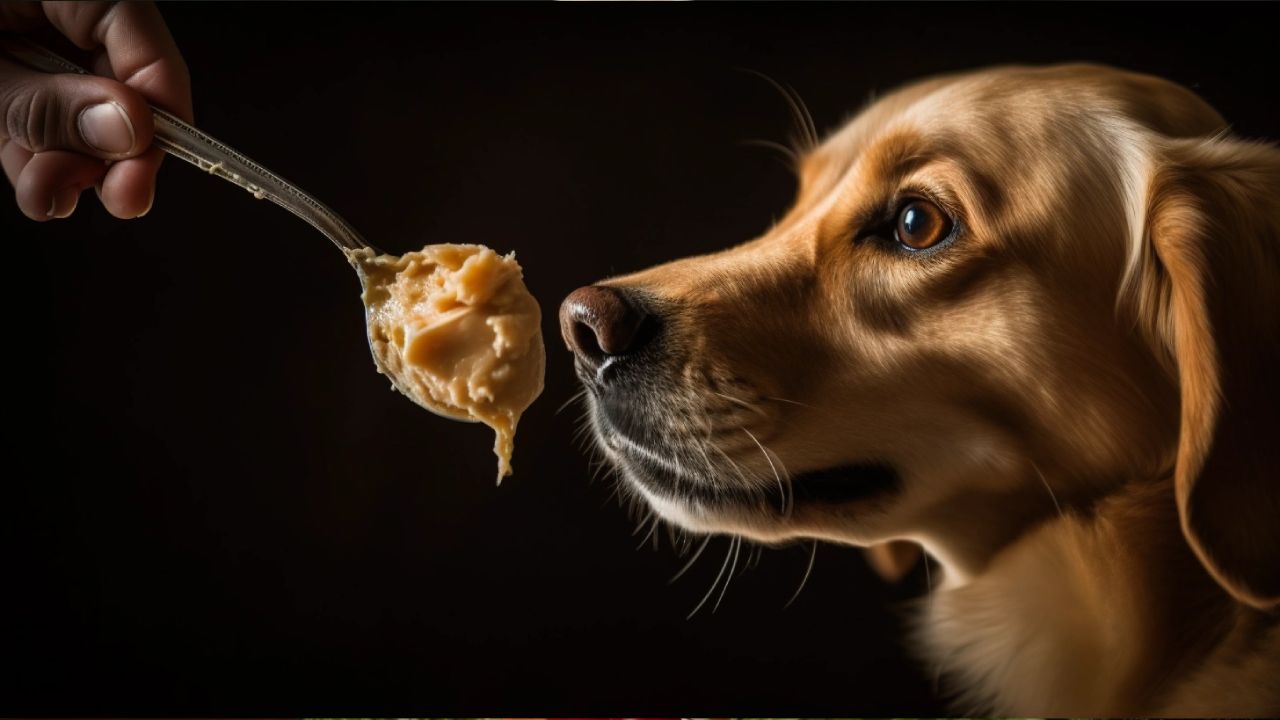Curiosity about what our furry companions can and cannot eat often leads us to ask the age-old question: Can dogs eat peanut butter? The short answer is yes, but there’s more to it than meets the eye. Peanut butter can be a delicious and nutritious treat for dogs, but like any food, it has some caveats.
So, before you reach for that jar of creamy or crunchy goodness, let’s embark on a journey to discover the dos and don’ts of sharing peanut butter with your four-legged companion.
So, Can Dogs Eat Peanut Butter?
Their affinity for this creamy treat is undeniable, but it’s crucial to ensure their safety and well-being when sharing it with them.
Moderation is key. Peanut butter is calorie-dense, so limiting your dog’s consumption to no more than 10% of their daily caloric intake is wise. This prevents potential weight gain and maintains their overall health.
Choosing the proper peanut butter matters, too. Opt for natural, unsalted varieties without additives. Pay close attention to labels, as some peanut butter contains xylitol, an artificial sweetener toxic to dogs. Risks of Added Ingredients can cause a sudden drop in blood sugar levels, leading to severe health issues.
While peanut allergies in dogs are rare, monitoring them when introducing peanut butter is essential. Watch for symptoms like itching, swelling, hives, or gastrointestinal distress.
Dogs can enjoy this creamy or crunchy product when it’s given thoughtfully and responsibly. Stick to natural, additive-free options, avoid products with xylitol, and ensure they fit your dog’s daily caloric limits.
How is peanut butter good for dogs?
Peanut butter offers several benefits for dogs beyond being a delicious treat. Here’s a more detailed exploration of how peanut butter can be advantageous for our canine friends:
- High in Protein: Peanut butter is a good source of plant-based protein, essential for maintaining and repairing tissues in a dog’s body. Protein supports muscle development and overall health, making peanut butter a nutritious addition to their diet.
- Energy Boost: The healthy fats in peanut butter, such as monounsaturated and polyunsaturated fats, can provide a quick and sustained energy source for active dogs, helping them stay energetic throughout the day.
- Mental Stimulation: Many dogs love the challenge of working to lick peanut butter off a toy or treat-dispensing device. This mental stimulation can be a great way to keep your dog entertained and engaged, especially when they might be home alone.
- Medication Administration: Peanut butter can serve as an effective vehicle for administering medications. Its strong aroma and flavor can mask the taste of medicines, making it easier to ensure your dog takes necessary medications without fuss.
- Bonding and Training: Peanut butter can play a role in strengthening the bond between you and your dog. It can be used as a reward during training sessions, reinforcing positive behavior and helping your dog learn new commands.
- Enrichment: Smearing a small amount of peanut butter inside a dog toy or Kong can offer hours of entertainment as dogs work to extract every bit. This enrichment activity can prevent boredom and potentially reduce destructive behaviors.
- Nutritional Variety: Incorporating peanut butter into your dog’s diet can provide a healthy variety, which can be especially beneficial if your dog has specific dietary restrictions or sensitivities.
- Skin and Coat Health: The healthy fats in peanut butter can contribute to a shiny coat and healthy skin. Omega-3 and omega-6 fatty acids are essential for maintaining skin barrier function and reducing inflammation.
- Aging Support: As dogs age, their caloric needs may decrease, and peanut butter can offer a calorie-dense treat that still provides essential nutrients. Choosing a peanut butter that meets your senior dog’s dietary requirements is critical.

How Much Peanut Butter Can Dogs Eat?
Determining the appropriate amount of peanut butter for your dog is crucial to ensure they can enjoy this treat without any adverse effects.
Portion Guidelines
As a rule of thumb, peanut butter should make up at most 10% of your dog’s daily caloric intake. For instance, the American Kennel Club (AKC) recommends a tablespoon of peanut butter for a medium-sized dog (around 30 pounds).
The Best Way to Offer Peanut Butter
Try incorporating peanut butter into interactive toys or as a training treat to make peanut butter enjoyable and engaging for your dog while controlling their intake.
Watch for Caloric Intake
Remember to account for the calories consumed during training sessions when using peanut butter as a training reward. Adjust your dog’s meals to prevent overfeeding and maintain a balanced diet.
What Type of Peanut Butter is Best for Dogs?
Natural and Unsweetened
The ideal dog choice is natural, unsalted peanut butter. Natural peanut butter contains minimal ingredients, usually just peanuts and possibly some salt. It lacks the additives, preservatives, and excess sugar in some commercial peanut butter brands.
Avoid Xylitol
One crucial ingredient to watch out for is xylitol. Xylitol is an artificial sweetener often used in sugar-free products, including some peanut butter brands. It’s incredibly toxic to dogs and can lead to severe health issues like hypoglycemia (low blood sugar) and liver failure. Always read the ingredient label carefully to ensure that the peanut butter you’re offering your dog is xylitol-free.
Minimal Additives
Avoid peanut butter with additives like hydrogenated oils, palm oil, and excessive sugars when checking labels. These additives can contribute to health problems such as obesity and dog pancreatitis.
Low Sodium
Opt for peanut butter with low or no added salt. Dogs’ sodium requirements differ from those of humans, and excessive salt intake can lead to health complications, including dehydration.
Organic Options
Consider choosing organic peanut butter if available. Organic options often have fewer pesticides and chemicals, which can benefit your dog’s health and the environment.
Homemade Peanut Butter
You can make peanut butter at home for utmost control over ingredients. Blend unsalted roasted peanuts until they reach a creamy consistency. This way, you can be confident about what your dog is consuming.

Can a Dog Have an Allergic Reaction to Peanut Butter?
While most dogs can safely enjoy peanut butter, it’s essential to be aware that some may experience allergic reactions, although this is relatively rare. Allergies to peanut butter in dogs can manifest in various ways, and it’s crucial to know how to identify these signs:
- Itching: One common sign of an allergic reaction in dogs is itching. It could indicate an allergy if your dog scratches excessively, particularly around their face, ears, or paws.
- Hives: Hives, or urticaria, may appear as raised, red, or pink bumps on your dog’s skin. These can be itchy and uncomfortable for your pet.
- Swelling: Allergic reactions can cause swelling in various parts of your dog’s body, including the face, lips, and eyelids. If you notice sudden and unusual swelling, especially around the head, it’s a reason for concern.
- Gastrointestinal Upset: An allergic reaction may sometimes lead to gastrointestinal symptoms. This can include vomiting, diarrhea, or general stomach discomfort. If your dog exhibits these signs after consuming peanut butter, monitoring their condition closely is essential.
- Respiratory Issues: In severe allergic reactions, dogs can experience respiratory distress. This includes symptoms like coughing, wheezing, difficulty breathing, or rapid breathing. Observing these signs is a medical emergency, and you should seek immediate veterinary care.
If you’re introducing peanut butter to your dog for the first time, it’s prudent to monitor them for any signs of an adverse reaction closely. Start with a small amount to see how your dog reacts, and gradually increase the quantity if there are no adverse effects.
Peanut butter can be a safe and enjoyable treat for your canine companion when offered in moderation and the proper form. Opt for natural, unsalted peanut butter without additives like xylitol, and watch for any signs of allergies or adverse reactions. Remember that a bit of peanut butter can go a long way in making your furry friend’s day a bit more delightful!

FAQs
Can I give my dog peanut butter every day?
It’s best to offer peanut butter as an occasional treat to prevent excessive calorie intake.
What should I do if my dog accidentally consumes xylitol?
Contact your veterinarian immediately. Xylitol poisoning can be life-threatening and requires prompt medical attention.
Are there other nut butter safe for dogs?
Some dogs can tolerate other nut jars like almond or cashew butter. Consult your vet before introducing new treats.
How can I use peanut butter as a treat?
You can stuff a Kong toy or use peanut butter as a training reward, but always ensure it’s in moderation.
Can I give my dog any peanut butter, or are there specific safer ones?
It’s essential to choose peanut butter for your dog that is natural and free of additives. Look for options that contain only peanuts or peanuts and salt. Avoid peanut butter varieties that include xylitol, as it is toxic to dogs.






Peanut butter is a staple treat for my pup. know ya dog-friendly peanut butter brands?
This was super informative! I always thought peanut butter was harmless for dogs. Now I know better. Thanks for sharing such important details about choosing the right peanut butter. 🥜🐾
Good to know it’s safe. Just have to hide it from him now or he’ll go nuts